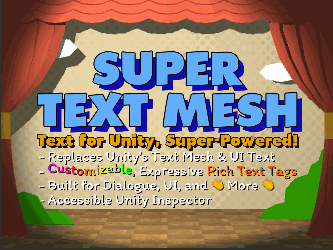I'm working on a Switch port of my game, so I've been paying more attention to the profiler recently. I noticed that SetMesh gets called every frame, and there's a comment at like 1761 saying "TODO: make this only get called if something changed, or it's animating".
Figured I might as well ask: were you able to make progress on this? It seems like it would have a big impact on performance in some situations.
In this case, I have an ASCII art with a custom <c> gradient that's using a lot of CPU. In the editor, STM's Update method is eating up 2.5ms (sounds like a small number, but it drops the framerate on the Switch to 30 fps). Even with the ASCII disabled, the rest of the (non-animated) text is still taking 1ms on my desktop computer.
Now, the rest of the screen is static while this is happening, so the frame drops aren't super noticeable. But, it would be great if there were some optimization that could be done here, especially if calling SetMesh in Update is not really needed.


